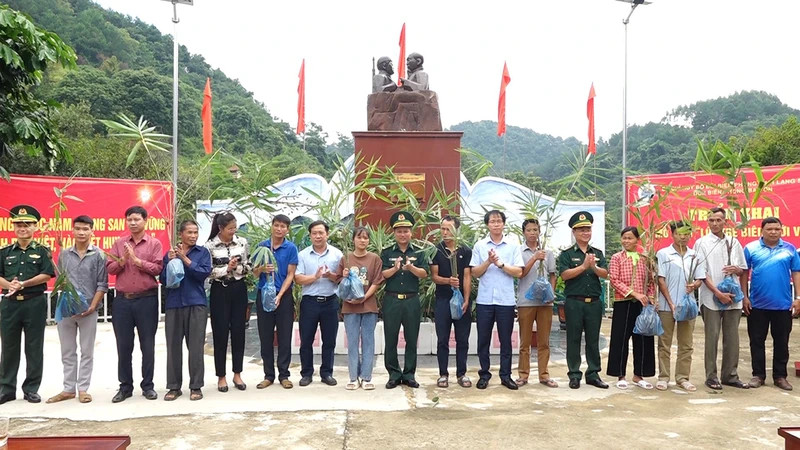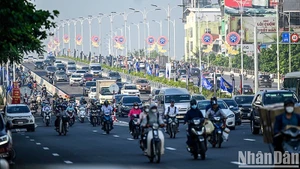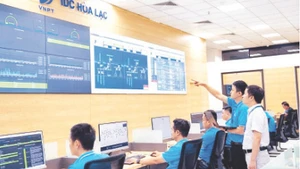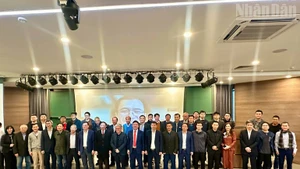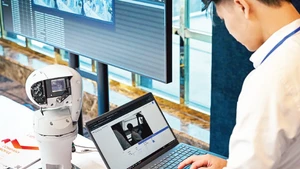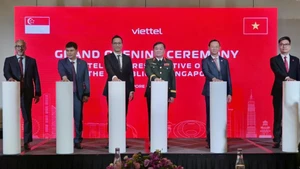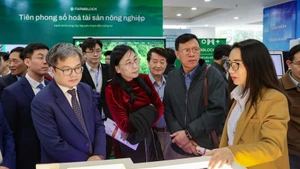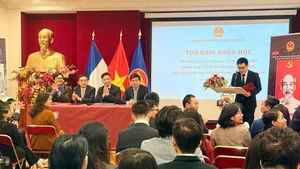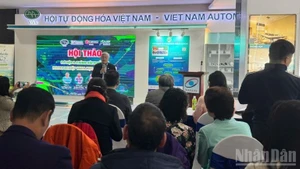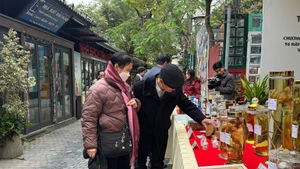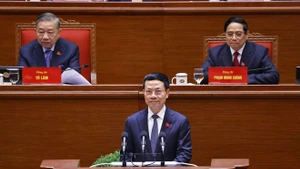However, the digital transformation process also poses many challenges, especially in building a digital data system and a digital cultural environment. During the digital transformation process, many localities and units have invested heavily in training and fostering staff while building mechanisms and policies to support the application of technology in propaganda work.
Strengthening communication effectiveness, expanding access
Recently, at the programme “Ho Chi Minh - Journey of Aspiration 2024”, the Party Central Committee's Commission for Communication and Education announced a digital data system on typical examples of studying and following Ho Chi Minh’s ideology, morality and style (address: lyluanchinhtri.dcs.vn/hanh-trinh-khat-vong-2024). Through this digital data system, people have an additional channel of information to communicate with individuals, typical examples, learn and study excellent models.
Many typical examples have become role models in society, such as Ma Seo Chu, 33 years old, Head of Kho Vang Village, Coc Lau Commune, Bac Ha District (Lao Cai Province), who saved hundreds of villagers from death in the recent historic Storm Yagi. From the information on this data system, many localities have learned and applied excellent models.
The “Vietnamese Border Bamboo Fence” model is a movement of the Lang Son Provincial Border Guard, which has now spread to many localities across the country. Many other excellent models have actively contributed to the effective implementation of socio-economic development goals in the locality.
In 2024, the Quang Tri Provincial Party Committee’s Communication and Education Department piloted a political theory training course, updating new knowledge for cadres and party members working at the grassroots level in an online format. This digital transformation in political theory teaching has helped the locality save budget and expand the number of trained students.
If the previous class had a maximum of only 100 students, the online class has been expanded without limit. Head of the Quang Tri Provincial Party Committee’s Communication and Education Department, Ho Dai Nam, informed that the Standing Committee of the Quang Tri Provincial Party Committee has set a goal that during this term, each cadre and party member will be trained in theory and updated with knowledge at least once. This is an impossible goal if the province follows the traditional method of training and fostering political theory.
To successfully transform digitally by organising political theory training classes and updating new knowledge online, Quang Tri Province has a long preparation process, especially in building a digital culture. According to Nam, the most important step is to communicate and mobilise to create common awareness in the digital transformation work of agencies and units. To create a “digital ecosystem”, in addition to digital means, there must also be digital skills and digital culture.
Localities and units, even those with less related professional work, actively participate in digitising the system of documents and texts, establishing community digital technology groups to participate in the process of building a digital cultural environment. Regarding data sources, the Provincial Party Committee’s Communication and Education Department has digitised the system of resolutions, Party documents and related documents, regularly updating new documents in the data warehouse.
From the results of the “Quang Tri Model”, Nguyen Trong Nghia, Politburo member, Secretary of the Party Central Committee, and Head of the Party Central Committee's Commission for Communication and Education, said that the Commission’s leaders are very interested in and support the model of political theory training for cadres and party members on the internet. In the coming time, the Commission will direct localities and units to replicate this model.
According to statistics from the Ministry of Information and Communications, Vietnam currently has about 78.5 million internet users, 73 million social network users, and community digital technology groups have developed into villages, hamlets, and residential areas. This shows that digital data and digital culture are increasingly closely linked to social life. All levels, sectors, and the entire political system have appropriate methods to increase propaganda effectiveness.
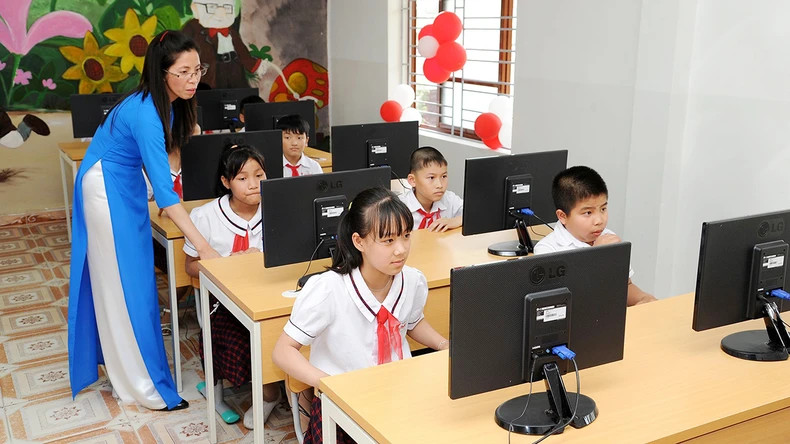 |
| The “AI for All” model has been piloted in many schools in Yen Bai Province. |
Diverse in form, lively in the way of conveying information
Grasping the trend of young people becoming increasingly familiar with mobile devices and social networks, Vice Chairman of the Vietnam Fatherland Front Committee of Phinh Ho Commune (Tram Tau District, Yen Bai Province) Sung A Tua has researched, learned and built several personal channels on many social networks to promote the image of his hometown. Through short videos, A Tua shares stories about the customs and daily life of the people in his hometown's highlands and attracts many interested followers.
Thereby, he has connected many benefactors to help those in difficult circumstances in the locality. Recently, Sung A Tua has boldly exploited the content to promote OCOP products and community tourism activities, opening up opportunities for economic and social development in mountainous communes with many difficulties. The successes of Sung A Tua are the result of the active digital transformation policy implemented by the Yen Bai Provincial Party Committee in recent years.
The mountainous province of Yen Bai is the leading locality in the country to launch the model “People learn AI (artificial intelligence)”. After more than a year of implementation, many civil servants of departments, branches, sectors and localities in the province use AI as a powerful assistant. Especially in the education sector, many schools use AI to support teaching learning and create many products on digital platforms.
According to Deputy Director of the Department of Information and Communications of Yen Bai Province Nguyen Thuc Manh, the model “People Learn AI” is important for the province to promote digital transformation and develop the digital economy and digital society. The widespread application of AI tools will create a strong push to help develop the digital economy and society and improve the efficiency of workers.
The “AI for All” model is an important model for the province to promote digital transformation and develop the digital economy and society. The widespread application of AI tools will create a strong push to develop the digital economy and society and improve the efficiency of workers.
Deputy Director of the Department of Information and Communications of Yen Bai Province Nguyen Thuc Manh
The Vietnam Military History Museum recently welcomed a large number of visitors thanks to the application of AI in exhibition, communication and education. Hundreds of thousands of visitors have visited the museum in recent days, showing the great attraction of the museum. Many visitors said that digital technology has helped them learn detailed information about many valuable artefacts in the museum.
Lieutenant Colonel Nguyen Thi Lan Huong, Head of the Communication and Education Department under the Vietnam Military History Museum, informed that there are some Sundays when the museum welcomes about 60,000 visitors. The area that attracts the most visitors is the thematic exhibition, using AI technology to introduce artefacts and 3D videos describing major battles. AI technology helps visitors interact with artefacts through the virtual world and chat with historical witnesses. These are experiences that cannot be had if the museum still displays them using traditional methods.
Building a standard data system
In an article on digital transformation, General Secretary To Lam emphasised that promoting digital transformation associated with ensuring security and safety is an objective necessity for Vietnam to make a breakthrough in the new era.
Recently, taking advantage of cyberspace, hostile forces have stepped up activities to sabotage the Vietnamese revolution. According to the representative of the Ministry of Information and Communications, one of their most insidious tricks is to distort part of the truth, causing many people to lose their vigilance.
Although the authorities have tightened the management of bad and toxic news sources in cyberspace, the requirement to build a standard digital data system has become more urgent because we cannot just ask “digital citizens” to know how to filter information while there is no standard, official data system.
Returning to the story in Quang Tri, the process of building electronic lesson plans to serve political theory training classes and updating new knowledge was carried out meticulously and carefully. Director of the Department of Political Theory under the PCC’s Commission for Communication and Education Doan Van Bau said that close coordination with the specialised departments of the Commission and the Communication and Education Department of Quang Tri Provincial Party Committee aims to ensure the highest accuracy, update the latest documents and viewpoints of the Party on the content of the topics so that theoretical issues closely follow current events and local practices as well as the country's development trends.
In theory, this information system will be used by propagandists as evidence to mobilise and propagate the masses, thus requiring high consistency. Thus, administrators must regularly update new information, new knowledge, and new viewpoints.
Dr. Le Thu Hong from Ho Chi Minh Institute and Party leaders, Ho Chi Minh National Academy of Politics, informed that updating new information and new perspectives is necessary for the digital data system, especially for documents and political theory textbooks. In reality, many terms and concepts have changed over time, if not updated, it will cause negative impacts on propaganda work.
Digital transformation to improve the quality of communication with official information, rich and vivid forms, targeting many subjects, requires the synchronous participation of all levels, sectors and the political system. In addition, building official information channels and standard digital data systems helps propaganda and education work become more effective, contributing to preventing bad and toxic information.
